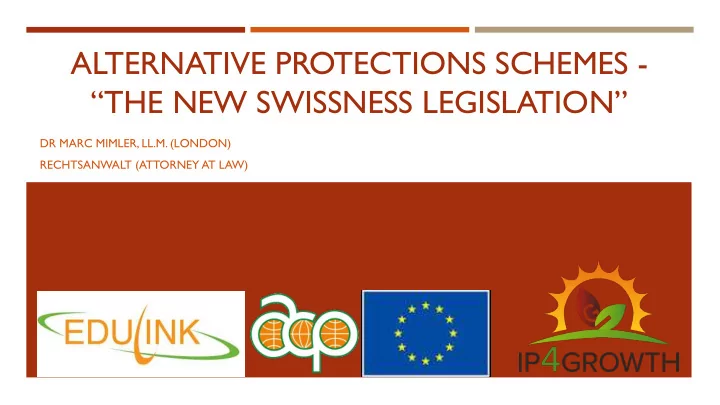

ALTERNATIVE PROTECTIONS SCHEMES - “THE NEW SWISSNESS LEGISLATION” DR MARC MIMLER, LL.M. (LONDON) RECHTSANWALT (ATTORNEY AT LAW)
SWISS MADE AND ITS CONNOTATIONS ¡ Reliable ¡ Industrious ¡ Innovative ¡ Organised ¡ Precise ¡ Quality driven
APPAREL
SOME INDUSTRY EXAMPLES
THE SWISSNESS LEGISLATION – RATIONALE ¡ Swiss Goods and services have high reputation among consumers at home and aboard. ¡ Due to this reputation higher prices can be achieved (20% more for general products, 50% more with luxury goods - Watches). ¡ Many companies use Swiss terms (“Swiss”, “Made in Switzerland”, “Swiss Quality”) or emblems (“Wilhelm Tell,” “Matterhorn”) for co-branding. ¡ This has led to misappropriation through products that are hardly connected with Switzerland.
EXAMPLE OF “MISSAPPROPRIATION” Chocosuisse Union des Fabricants Suisse de Chocolat and Others v Cadbury Limited [1999] EWCA Civ 856 “Swiss Chalet“- Bar by Cadbury. ¡ Goodwill held by all Swiss chocolate producers. ¡ High Court held that significant amount of people would only mean Swiss chocolate coming from Switzerland. Misrepresentation by Cadbury
THE NEW LEGISLATION ¡ The Swiss Parliament passed the “Swissness” legislation on 21 June 2013. ¡ Legislation basically prescribes how much “Swiss” a product must be in order to be labelled “Swiss”. ¡ Also regulates when the Swiss cross can be applied to products.
LEGISLATION VALID UNTIL 31 DECEMBER 2016 Products: ¡ 50% of the production cost must be the result from work conducted in Switzerland and the main production stage must occur within Switzerland. Services: ¡ Head office of the entity must be seated in Switzerland or the people having the actual control of the entity are either Swiss nationals or have their domicile in Switzerland.
THE LAW APPLICABLE FROM 01 JANUARY 2017 Natural Products (i.e. mineral water, plants and meat): ¡ 100% from Switzerland (fountain - place of harvest - where the animal spent most of its life, or place of hunting or fishing) Industrial products: ¡ At least 60% of manufacturing costs must occur in Switzerland. All production costs (i.e. costs for raw materials, semi-finished products, accessory parts, product-related salaries and production overhead costs) can be taken into account and now additionally the costs for research and development, quality assurance and certification. ¡ In addition, at least one essential manufacturing step must have taken place in Switzerland. ¡ Note: Special legislation for watches and cosmetics. Services: ¡ Entity must have its headquarters in Switzerland and must be actually administered from there.
THE LAW APPLICABLE FROM 01 JANUARY 2017 – FOODSTUFFS ¡ General Rule: ¡ At least 80% of the weight of the raw materials of the weight of the available raw materials in Switzerland must actually originate in Switzerland. ¡ Milk and Milk products must be 100% Swiss.
USE OF THE SWISS CROSS Products: ¡ Newly introduced now for products (previously only for advertisement and decorative uses). ¡ Use of cross now possible when products are made according to the new legislation. Services: ¡ Allowed for Swiss services.
WHAT ABOUT SWISS CHOCOLATE? ¡ Chocolate consists substantially of Cocoa Beans. at least 43% Cocoa Solids, including not less than 26% Cocoa Butter; less for milk chocolate and couverture Chocolate - Directive 2000/36/EC. ¡ Ivory Coast: Largest producer of cocoa beans worldwide (33% in 2012).
SPECIAL RULES FOR CHOCOLATE AND COFFEE Art 48 b (3) Swiss TM Act (de lege ferenda) ¡ Excluded from the rule that subsection 2 of this Article provides are such natural products that cannot be produced in Switzerland due to natural conditions (i.e. Cocoa, coffee, avocado etc.). ¡ Milk in the Milk Chocolate however must be from Switzerland for the chocolate to qualify as Swiss chocolate. ¡ Also such natural products that are temporarily not available (i.e. crop failure harvest – however: restrictive use!). ¡ Reference to single Swiss ingredient possible (i.e. lasagne with Swiss beef) – However, no use of Swiss cross possible on the entire product.
REGISTER OF GEOGRAPHICAL INDICATIONS FOR NON- AGRICULTURAL PRODUCTS (PDO/PGI) ¡ The new legislation will establish a register of protected designations of origin (PDO) and geographical indications (PGI). ¡ Registry will be held at the Swiss Intellectual Property Institute. ¡ Intended to reinforce their protection in Switzerland and abroad. ¡ It applies, in particular, to handcrafted products in the non-food sector such as textiles or ceramics, industrial products such as watches, and products obtained through extraction such as minerals or salts.
SOME CONSEQUENCES ¡ Not everyone in the industry was happy. ¡ Loss of use of the Swiss cross for many products even when they are produced by Swiss companies Example: “Michel Saft” produced since 1929. ¡ Trade off: Purchasing expensive ingredients to remain “Swiss” but then lose on price competition. ¡ Where companies use foreign products (and lose their “Swissness”) then the question arises whether they should move production abroad. ¡ Industry association “Fédération des Industries Alimentaires Suisses » (FIAL) asked for more exceptions for products that were not available in Switzerland or did not have the required quality.
ISSUES WITH TRIPS? Definition of Geographical Indications ¡ Article 22.1: … indications which identify a good as originating in the territory of a Member, or a region or locality in that territory, where a given quality , reputation OR other characteristic of the good IS essentially attributable to its geographical origin. Do products solely coming from domestic raw materials actually contribute to a quality, reputation or characteristic? (i.e. Swiss sugar does not contribute to the characteristic of the good; is not different to other comparable materials) Could therefore not be applicable for GI protection according to TRIPS. (Thomas Cottier and Rachel Liechti-McKee, Sind die neuen Swissness-Bestimmungen mit den völkerrechtlichen Verpflichtungen der Schweiz vereinbar? Die Volkswirtschaft 10-2014: http://dievolkswirtschaft.ch/content/uploads/2014/10/08_Cottier_DE.pdf)
MERCI DE VOTRE ATTENTION!
Recommend
More recommend